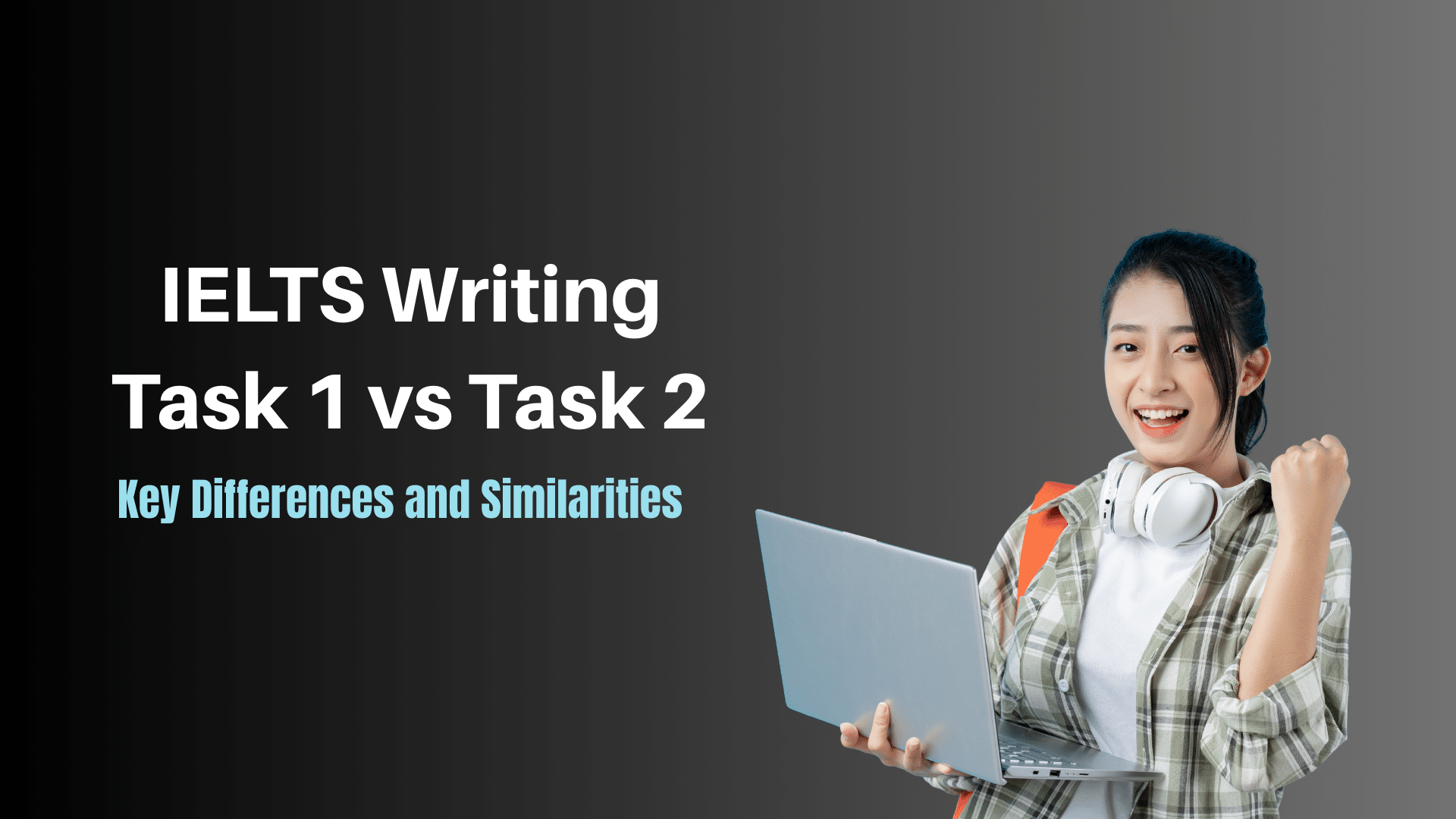
IELTS Writing Task 1 vs Task 2 – Key Differences and Similarities
When preparing for the IELTS Writing test, many students wonder how Task 1 and Task 2 compare. While both tasks test your ability to write clearly and accurately in English, their formats, expectations, and scoring focus are different. Understanding these differences and similarities will help you perform your best in both tasks.
Overview of IELTS Writing Tasks
- Task 1
- Academic: Summarise and describe visual data (charts, graphs, diagrams, or processes).
- General Training: Write a formal, semi-formal, or informal letter.
- Task 2
- Write an essay responding to a point of view, argument, or problem.
Key Differences Between Task 1 and Task 2
| Feature | Task 1 | Task 2 |
|---|---|---|
| Word Limit | At least 150 words | At least 250 words |
| Time Recommendation | About 20 minutes | About 40 minutes |
| Type of Writing | Academic: Data/Process description; GT: Letter writing | Argumentative, opinion, problem-solution, or discussion essay |
| Marks Weightage | Worth 1/3 of the total writing score | Worth 2/3 of the total writing score |
| Structure | Introduction → Overview → Key details | Introduction → Body paragraphs → Conclusion |
| Skills Tested | Summarising, comparing, describing trends | Presenting arguments, giving examples, critical thinking |
| Formality | Academic: Formal; GT: Varies (formal/semi-formal/informal) | Always formal |
Similarities Between Task 1 and Task 2
Despite their differences, both tasks share some important similarities:
- Scoring Criteria
- Both are assessed on Task Achievement/Response, Coherence and Cohesion, Lexical Resource, and Grammatical Range and Accuracy.
- Requirement for Clarity
- In both tasks, you must write clearly, organise ideas logically, and use linking words effectively.
- Formal Tone in Academic IELTS
- For Academic IELTS, both tasks require a formal writing style.
- No Bullet Points
- Both tasks require full sentences and paragraphs, not lists or bullet points.
- Grammar and Vocabulary
- A wide range of grammar and vocabulary is essential in both to score Band 7 and above.
Tips to Score Higher in Both Tasks
- Time Management – Spend 20 minutes on Task 1 and 40 minutes on Task 2 to match their weightage.
- Plan Before Writing – Outline your ideas for better structure and flow.
- Avoid Repetition – Use synonyms and paraphrasing instead of repeating words.
- Check Your Work – Leave 2–3 minutes to check grammar, spelling, and vocabulary.
Final Words
While IELTS Writing Task 1 focuses on describing or summarising information, and Task 2 tests your ability to express and justify opinions, both require strong writing skills, a clear structure, and accurate grammar.
At MKS Education, our expert instructors guide you through both tasks with strategies, practice materials, and personalised feedback so you can achieve your target IELTS score.
Frequently Asked Questions
Click a question to expand. Mobile‑friendly, colorful, and accessible.
1) What is the IELTS exam?
The International English Language Testing System (IELTS) measures your English proficiency for study, migration, or work. It has four sections: Listening, Reading, Writing, and Speaking.
2) How long is the IELTS score valid?
Most institutions accept IELTS scores that are up to two years old. Always confirm with your target university or immigration body.
3) What is the difference between Academic and General Training?
Academic is for higher education or professional registration. General Training is for migration or work experience in English‑speaking countries.
4) Writing Task 1 vs Task 2 – how do they differ?
- Task 1 (Academic): Describe charts/graphs/processes in ≥150 words.
- Task 1 (GT): Write a letter (formal/semi/informal).
- Task 2: Write an essay (≥250 words) presenting and justifying ideas.
5) How is IELTS Writing scored?
Both tasks are assessed on Task Achievement/Response, Coherence & Cohesion, Lexical Resource, and Grammatical Range & Accuracy.
6) How should I manage time in Writing?
Spend about 20 minutes on Task 1 and 40 minutes on Task 2. Leave 2–3 minutes for checking grammar and spelling.
7) Can I use bullet points?
No. Write in full sentences and organized paragraphs. Bulleted lists are not accepted as answers.
8) What band score do universities usually require?
Requirements vary. Many undergraduate programs look for 6.0–6.5, while competitive or postgraduate programs may need 7.0+.
9) Is spelling important?
Yes. Spelling, punctuation, and grammar affect your score in Writing and Reading. Choose one convention (UK/US) and keep it consistent.
10) Do you provide coaching and mock tests?
Yes! We offer strategy classes, section‑wise practice, full‑length mock tests, and personalized feedback to help you reach your target band.
📞 Contact Us:
- Mobile: 9818173800
- Landline: 015921177
- Location: Opposite to Shankerdev Campus, Putalisadak, Kathmandu
🌐 Visit Us: mksprep.com
👁👁 Views: 1000190
